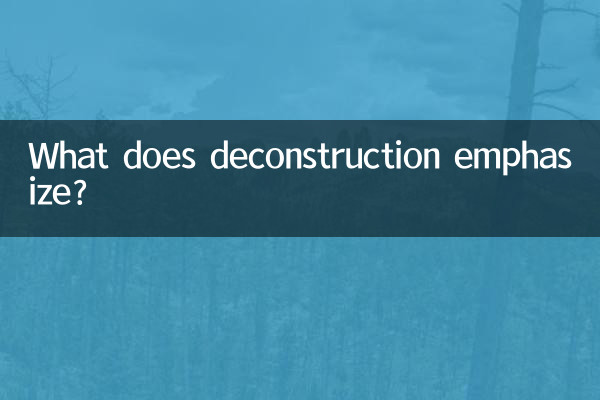What does deconstruction emphasize?
Deconstruction as a theory of philosophy and literary criticism was proposed by French philosopher Jacques Derrida in the 1960s. It emphasizes the critical analysis of text, language, and structure in an attempt to uncover the contradictions and uncertainties implicit within them. In recent years, the idea of deconstruction has once again become a hot topic in social, cultural and technological fields. The following is a summary of the hot topics on the Internet in the past 10 days, combined with the core views of deconstruction, to explore its practical significance.
1. The core viewpoint of deconstruction

Deconstruction emphasizes the critique of traditional binary oppositions (such as subject/object, truth/falsehood, center/periphery), arguing that these oppositions are not absolute but constructed through language and culture. Here is the structured data for its core points:
| core ideas | Specific content |
|---|---|
| The resolution of binary oppositions | Question the oppositional relationships in traditional philosophy, such as rationality/emotion, male/female, etc. |
| textual uncertainty | It is argued that the meaning of a text is fluid and cannot be fixed or fully deciphered. |
| absence of center | Deny any absolute center or authority and emphasize diversity and difference. |
2. The relationship between hot topics in the past 10 days and deconstruction
The following are hotly discussed topics on the Internet in the past 10 days, analyzed from a deconstructionist perspective:
| hot topics | deconstruction perspective |
|---|---|
| Artificial Intelligence Ethical Controversies | Deconstruct "anthropocentrism" and explore the equal relationship between AI and humans. |
| Gender Identity Discussion | Challenge traditional gender binary oppositions and support diverse gender expressions. |
| Social media algorithm bias | Revealing the power structures behind algorithms and questioning the myth of “objectivity”. |
| Responsibility for climate change | Eliminate the simple opposition of "developed countries/developing countries" and emphasize global shared responsibility. |
3. The practical significance of deconstruction
Deconstruction is not only a theoretical tool, but also a way of critical thinking. It reminds us:
1.Question authority: Deconstruction encourages questioning of any authority that claims "absolute truth," whether in politics, science, or culture.
2.embrace complexity: The world is not black and white, and deconstruction helps us accept contradictions and ambiguity.
3.Pay attention to marginalized voices: By deconstructing the opposition between center and periphery, we can hear more overlooked perspectives.
4. Case: Application of deconstruction in contemporary art
The following is an analysis of works embodying deconstructionism in recent art exhibitions:
| works of art | Deconstructive elements |
|---|---|
| "Broken Mirror" | Questioning the concept of the “whole self” through fragmented forms. |
| "Untitled (Noise)" | Blurring the boundaries between music and noise, challenging aesthetic standards. |
| "Virtual Identity" | Exploring the multiplicity and fluidity of identities online and offline. |
5. Inspiration for the future
In the era of information explosion, the value of deconstruction is even more prominent. It provides a way to:
- Analyze power relationships and implicit assumptions in massive amounts of information
- Understand meaning generation in different cultural contexts
- Build a more inclusive social discourse
As Derrida said: "Deconstruction is not destruction, but necessary questioning." In this era of uncertainty, the critical thinking of deconstruction may help us better deal with complexity and create a more open social space.

check the details

check the details